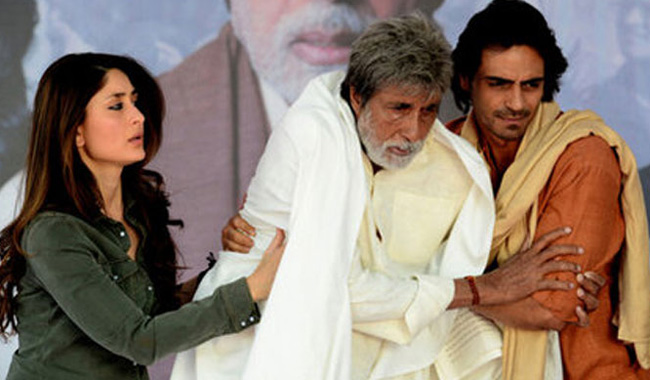'Satyagraha' review: Prakash Jha offers nothing newKhalid Mohamed | 3 hours 10 min ago
Cast: Amitabh Bachchan, Ajay Devgn, Kareena Kapoor, Manoj Bajpai
Director: Prakash Jha
Rating: Two stars
Meet Daduji of Ambikapur. A retired schoolteacher, he's mega-peeved when he catches his about-to-be-married son swigging a bit of booze. In fact, all hell breaks loose. And woe and behold, the son's drinking buddy is even banned from attending the wedding ceremony. A tad intolerant, isn't he, this Daduji?
But that's the way it is in Prakash Jha's Satyagraha', which hauls you back to the director-writer's favourite grazing ground: a smallish town brimming over with corruption, a crazy beggar called Transformer, a half-hearted item number, not to forget cavalcades of good ole Ambassador cars carrying an entire cosmos of ministerial baddies. Quite tyresome actually.
Come to think of it, you last saw the same self-righteous senior citizen, Daduji, combating the political Rasputins in Jha's Aarakshan'. Now he's back along with some cast alterations, to enact a story inspired by the Anna Hazare movement against cash grabbers. And there's a conscience stricken youngish man, too, spawned by Arvind Kejriwal, to rustle up some surrogate father-son emotional frisson.
As always politically, Jha's targets of attack remain obscure. The melodrama, as a result, is rooted in Ambikapur and its zillas, never to assume a national dimension. All that you can surmise is that Daduji and his supporters are pitched against the ruling state government, party ideology unclarified.
Indeed, confusion prevails as sarkari chambers and police chowkies proliferate with portraits of legendary Congress leaders. But wait, the word communal' is dropped jejunely, compounding your confusion. So who or what exactly is the System here?
At most, it is an abstract local governance, dominated by a wicked minister (Manoj Bajpai) and a Chief Minister (Anonymous) flanked by goons and ghouls aplenty.
How they snigger!
Incredibly enough, for decades Daduji (Amitabh Bachchan) and thousands of Ambikapurkars have tolerated oppression from such ghouls. Something's got to give, and it does. A satyagraha is sparked by the mysterious death of Daduji's son, who's run over by a truck on the highway. Boom! The township stirs into action. And what do you know? Manav (Ajay Degn), that drinking buddy re-enters, even giving up all his gazillions of wealth to look after the health of Daduji who's quite weary of it all by now. And so goes on an indefinite hunger strike. Tsk.
Moved to glycerine tears, TV news reporter Yasmin (Kareena Kapoor), also gives up her comforts, to become one of the poster-girls on the huge banners of political protest. For much-needed diversion, she also falls in love with Manav, but ticks him off whenever she disagrees with his bad calculations. Attagal, welikes.
As for Daduji's widowed daughter-in-law (Amrita Rao), she either cooks, weeps or darts grim reaction shots to the camera. And to complete the star package, Daduji's ex-student (Arjun Rampal), once a goon but now more luminous than a full moon, is on stand-by to galvanise a tweet-and-Facebook savvy youth morcha. Too much happening here and without pause or reflection.
The staging of the dramaturgy and the locations are strictly Prakash Jha: one sketchy event after another set in cozy cottages, busy boardrooms, and the town square where multitudes throng for the finale. The climax is somewhat of a cop-out " or pointless.
Truly, in some 140 minutes, Jha and his co-storywriter Anjum Rajabali tread the timetested path of corruption-bashing, without ever suggesting a way out of the morass.
If there is something of a resolution, it is only in terms of a dangling line of dialogue at the end. Suffice it to say, you leave, wondering whether Satyagraha is a defence of Hazare or a spectacle of sound and fury signifiying precious little. A pity.
Because Jha does strike up a believable relationship between the unbending Dadu and Manav, which is humane and moving. For sure, the best sequences in Satygraha, deal with the alterations of their mind-sets. And it's here that Amitabh Bachchan and Ajay Devgn, light up strong acting sparks. Of the rest of the crowded cast, Manoj Bajpai is bankably forceful. Kareena Kapoor is impressive despite the cliched role of an I-Pad flaunting journalist.
Come to think of it, throughout, the depiction of the media's role in political protests, is shallow. One solitary journalist is the protest's flag-bearer, while others inevitably ask dumb questions. And what does one do about the unintentional funny moments?
Like the journalist instructing her videographer to start shooting although he's already been at it with the camera. Or a chain of Buddhist monks suddenly crossing the field of the camera out of nowhere. Or the moment when the journo reads a book in pitch darkness, setting off a titter in the Inox auditorium on Friday morning.
Without a doubt, Prakash Jha -- a perennial political complaint box -- offers nothing new either by way of content or style. How you'd like insights and information, from him, which you don't know already. That would amount to excellent cinema, and not just one more star-fuelled trip into a political void.
Suggestion: avoid.
Movie review: Satyagraha thought provoking, but quickly loses charm
by Shiv Visvanathan Aug 30, 2013
Prakash Jha's Satyagraha creates a new genre of politics out of an old set of plots. The movie director who produced Damul, Gangajal, Apaharan and Mrityudand, Rajneeti, Aarakshan, and Chakravyuh continues his effort to capture contemporary Indian politics, its agents of change. The old game of sociological prediction which located agency in certain classes or communities is now doomed. Politics bursts into being at unpredictable points, with an unpredictable cast of actors.
The creation of myth for the movie is the murder of the idealistic IIT student Satyendra Dubey who protested against corruption in the Highways Authority. The young man fades into oblivion as his father and friend take over the struggle. As an epic movie Satyagraha can read in myriad ways, the most obvious is as a fictional rendition of the Hazare movement. The audience plays its own games equating Kejriwal's team and Jha's characters.
There is the father played by Amitabh Bachchan, who blossoms into a Anna Hazare like character. The actor who skyrocketed into fame as the angry young man of cinema becomes the epitome of non-violence: The angry old man of peace. It is an interesting twist to a cinematic career.
A still from the film, Satyagraha. Pic: satyagrahathefilm
Arvind Kejriwal is represented by a newly activist business man not averse to bribing on occasion. Shazia Ilmi and Kiran Bedi are here, as well, represented by a journalist who understands what social media is about and a policeman who finds his old corruption indigestible. We also have a lawyer who looks a tepid version of Prashant Bhushan.
But the equivalence game doesn't do justice to either reality or the movie, and quickly loses its charm. Realism is a burden that cinema finds difficult to bear, and creativity demands fiction goes beyond merely representing the facts.
Suddenly it is more than just corruption in a road project. It is corruption as a way of life and a grammar for living. The murdered man's widow attempts to get a compensation announced by the minister. She enters the labyrinth which involves everyone else in the battle. One woman's difficulty becomes everyone's battle. Bachchan slaps the Deputy Collector in an un-satyagrahic move and is arrested. That one act triggers the rest of the movement. The exemplar becomes the paradigm for the struggle.
Jha shows a certain realism. The struggle is of a new kind. Corruption is elaborate and it now needs a task force, a project team to undertake the battle. One suddenly realizes the new struggles are different. One cannot stereotype them or reduce them into socialist or Naxal archetypes. One needs a new skill set around information and media to fight these political battles. IT and media alter the old game of class struggle. And Jha is shrewd enough to understand and tap into that theme.
In Satyagraha, idealism does not always lead to revolution. The soul of the activist can brew in any person, irrespective of class. Puritanism in ideology or as archetype is no longer helpful. Sometimes ambitions alchemise into idealism. For example the journalist is only interested in events that make "history". She cannot initially believe that a little town in Bihar can be the site for the beginning of a significant movement. The businessman, in turn, entices her into covering the battle by inflating numbers in social media.
Jha also offers a similarly complicated view of the middle class, which produces the venal and the upwardly mobile and also the most impeccable of idealists. It's the unpredictable diversity of the middle class that makes it so fascinating. The corporate entrepreneur becomes the activist and the ideologist becomes the committee bureaucrat. Jha also shows that an idealistic middle class can be sensitive to suffering among other strata. It realizes it has to create a broader language of struggle, an amalgam of dialects to be truly representational.
Jha's Satyagraha struggles with the representation of non-violence whose ascetic rituals lack the seductive power of violence. Gun versus gun offers an easier resolution of drama and history. Non-violence does not emerge as a worldview but is represented by exemplars, in this case the patriarchal Bachchan, an old nationalist who remains the vector of change.
The one constant in a Prakash Jha film is the connivance and the agility of politicians. The politician and the bureaucrat are the two forces that the new India must fight to bring about justice and change. Contempt of the legislature or of court mark the beginning of a new era of protest.
Jha fictionalizes history by reworking the collage of reality and in doing so he produces a more powerful myth. The Hazare movement itself was finally serialized into banality and the struggle reached a quiet entropy. But in the movie, Jha synchronises the contradictions and tensions of the anti-corruption movement to create more powerful narrative. He does not produce a solution but leaves the future of the struggle open ended. Jha creates a contemporary fable combining myth and history, news and fiction to create a thought-provoking film.
Shiv Visvanathan is a social science nomad.


























596